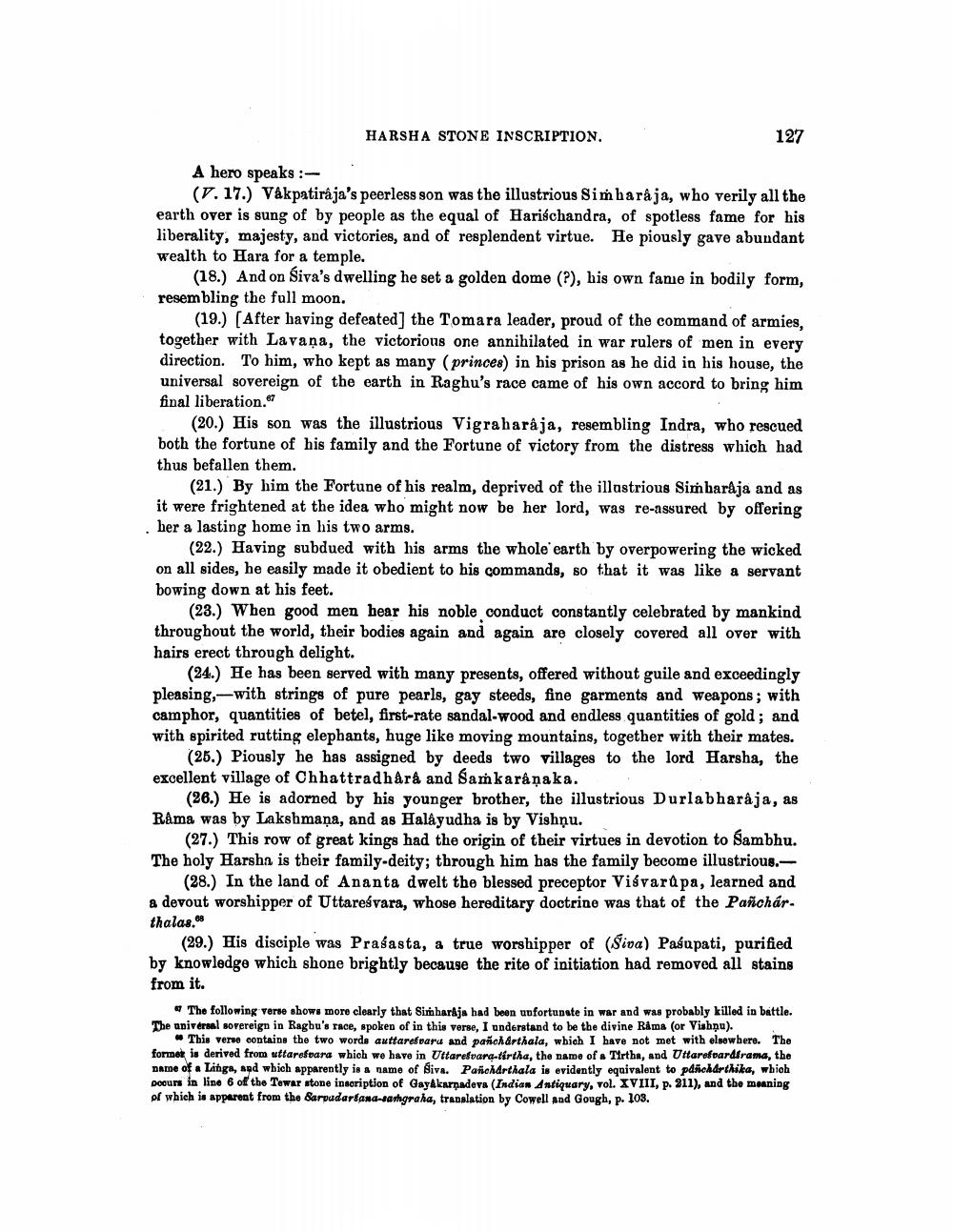________________
HARSHA STONE INSCRIPTION.
127
A hero speaks :
(V. 17.) Vakpatiraja's peerless son was the illustrious Simharaja, who verily all the earth over is sung of by people as the equal of Harischandra, of spotless fame for his liberality, majesty, and victories, and of resplendent virtue. He piously gave abundant Wealth to Hara for a temple.
(18.) And on Siva's dwelling he set a golden dome (?), his own fanie in bodily form, resembling the full moon.
(19.) [After having defeated] the Tomara leader, proud of the command of armies, together with Lavaņa, the victorious one annihilated in war rulers of men in every direction. To him, who kept as many (princes) in his prison as he did in his house, the universal sovereign of the earth in Raghu's race came of his own accord to bring him final liberation.
(20.) His son was the illustrious Vigraharaja, resembling Indra, who rescued both the fortune of his family and the Fortune of victory from the distress which had thus befallen them.
(21.) By him the Fortune of his realm, deprived of the illustrious Simbaraja and as it were frightened at the idea who might now be her lord, was re-assured by offering her a lasting home in his two arms.
(22.) Having subdued with his arms the whole earth by overpowering the wicked on all sides, he easily made it obedient to his commands, so that it was like a servant bowing down at his feet.
(23.) When good men hear his noble conduct constantly celebrated by mankind throughout the world, their bodies again and again are closely covered all over with hairs erect through delight.
(24.) He has been served with many presents, offered without guile and exceedingly pleasing, with stringe of pure pearls, gay steeds, fine garments and weapons; with camphor, quantities of betel, first-rate sandal-wood and endless quantities of gold; and with spirited rutting elephants, huge like moving mountains, together with their mates.
(26.) Piously he has assigned by deeds two villages to the lord Harsha, the excellent village of Chhattradhârâ and Samkaranaka.
(26.) He is adorned by his younger brother, the illustrious Durlabharaja, as Rama was by Lakshmana, and as Halayudha is by Vishņu.
(27.) This row of great kings had the origin of their virtues in devotion to Sambhu. The holy Harsha is their family-deity; through him has the family become illustrious.
(28.) In the land of Ananta dwelt the blessed preceptor Visvarapa, learned and a devout worshipper of Uttareśvara, whose hereditary doctrine was that of the Pañchár. thalas.
(29.) His disciple was Prasasta, a true worshipper of (Siva) Pasupati, purified by knowledge which shone brightly because the rite of initiation had removed all stains from it.
The following verse shows more clearly that Simharaja had been unfortunate in war and was probably killed in battle. The universal sovereign in Ragbu's race, spoken of in this verse, I understand to be the divine Rama (or Vishnu).
"This verse contains the two words auttarefvaru and pañcharthala, which I have not met with elsewhere. The formet is derived from uttarefnara which we have in Uttarefvara-tirtha, the name of Tirtha, and Uttarefoardrama, the name of a Linga, and which apparently is a name of Siva. Pafcharthala is evidently equivalent to pdfickdrthika, which peoun in line 6 of the Tewar stone inscription of Gayákarnadeva (Indian Antiquary, vol. XVIII, p. 311), and the meaning of which is apparent from the Sarpudarfana-sangraha, translation by Cowell and Gough, p. 103.




